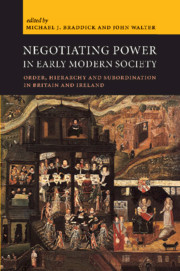Book contents
- Frontmatter
- Contents
- Notes on contributors
- Acknowledgements
- List of abbreviations and conventions
- Introduction. Grids of power: order, hierarchy and subordination in early modern society
- 1 Ordering the body: illegitimacy and female authority in seventeenth-century England
- 2 Child sexual abuse in early modern England
- 3 Sex, social relations and the law in seventeenth- and eighteenth-century London
- 4 Exhortation and entitlement: negotiating inequality in English rural communities, 1550–1650
- 5 Public transcripts, popular agency and the politics of subsistence in early modern England
- 6 ‘Bragging and daring words’: honour, property and the symbolism of the hunt in Stowe, 1590–1642
- 7 Administrative performance: the representation of political authority in early modern England
- 8 Negotiating order in early seventeenth-century Ireland
- 9 Order, orthodoxy and resistance: the ambiguous legacy of English puritanism or just how moderate was Stephen Denison?
- 10 Making orthodoxy in late Restoration England: the trials of Edmund Hickeringill, 1662–1710
- Notes
- Index
10 - Making orthodoxy in late Restoration England: the trials of Edmund Hickeringill, 1662–1710
Published online by Cambridge University Press: 13 March 2010
- Frontmatter
- Contents
- Notes on contributors
- Acknowledgements
- List of abbreviations and conventions
- Introduction. Grids of power: order, hierarchy and subordination in early modern society
- 1 Ordering the body: illegitimacy and female authority in seventeenth-century England
- 2 Child sexual abuse in early modern England
- 3 Sex, social relations and the law in seventeenth- and eighteenth-century London
- 4 Exhortation and entitlement: negotiating inequality in English rural communities, 1550–1650
- 5 Public transcripts, popular agency and the politics of subsistence in early modern England
- 6 ‘Bragging and daring words’: honour, property and the symbolism of the hunt in Stowe, 1590–1642
- 7 Administrative performance: the representation of political authority in early modern England
- 8 Negotiating order in early seventeenth-century Ireland
- 9 Order, orthodoxy and resistance: the ambiguous legacy of English puritanism or just how moderate was Stephen Denison?
- 10 Making orthodoxy in late Restoration England: the trials of Edmund Hickeringill, 1662–1710
- Notes
- Index
Summary
In the preface to the posthumous collection of his miscellaneous works of 1709, the Godly cleric Edmund Hickeringill (1631–1708) was described as being ‘averse to ceremonies and superstition; without a tincture of atheism; he was daring in the field, and prudent in the cabinet. He was a scholar without affectation, a divine without pride, and a lawyer that never took fee.’ Cambridge educated, in May 1652 he was ordained into the Baptist Church at Hexham, North-umberland. While chaplain to Robert Lilburne's regiment, a ‘grievous apostasy’ befell him and he became a Quaker. Although described by one contemporary as a ‘desperate atheist’, from October 1662 until his death in 1708 Hickeringill was a conforming rector of the established Church of England. That his reputation amongst contemporaries was controversial is indicated by two post-humous events. Henry Compton, his diocesan bishop, was reportedly responsible for erasing and defacing his funeral monument in the parish church, removing the phrase ‘Reverendus admodum Dominus.’ Two years later, further aspersions were cast against his orthodoxy when his collected works were cited, in the state trial of Henry Sacheverell, as evidence of the scandalous profanity of the times. To some, Hickeringill was a ‘false brother’; to others he was a devout defender of piety and true religion. Despite his public conformity, the course of his clerical career saw him in almost constant dispute and conflict with ecclesiastical authority. Historiographically, Hickeringill has been described as an example of the transition from the radical puritan critique of ‘popery’ to the deistical attack upon ‘priestcraft’. Hickeringill, it seems, challenged the authority of the established religious and political order at every opportunity.
- Type
- Chapter
- Information
- Negotiating Power in Early Modern SocietyOrder, Hierarchy and Subordination in Britain and Ireland, pp. 227 - 248Publisher: Cambridge University PressPrint publication year: 2001
- 1
- Cited by



